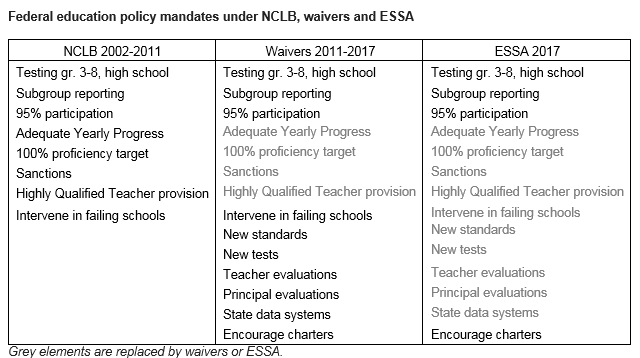It only took thirteen years, but this month Congress reauthorized the controversial No Child Left Behind Act (NCLB). The Every Student Succeeds Act (ESSA) is more important for what it undoes than what it does, because it dismantles the federal bureaucratic levers over state education policies that began under the George W. Bush administration. The irony is that NCLB was effectively replaced years ago, with the Obama administration’s waivers, and ESSA is popular largely because it officially replaces those waivers.
In 2002, NCLB introduced accountability requirements that greatly expanded federal control over public schools. Some NCLB requirements will remain under ESSA, including mandatory testing with 95% participation rates, results reported by subgroup, and, to some degree, state intervention in failing schools. However, many of the more onerous requirements of NCLB, like Adequate Yearly Progress, 100% proficiency targets, school sanctions and “Highly Qualified Teacher” requirements, were largely supplanted by NCLB waivers. With states straining under NCLB and no congressional action on the horizon, the Obama administration offered states waivers from these requirements, with strings attached.
The strings came in the form of adopting reforms favored by the administration. Those reforms, which included new career and college ready standards (read: Common Core) and their aligned tests, teacher evaluations using student test scores, and principal evaluation systems, were the same ones the Department used billions of dollars in Race To The Top grants (RTTT) to press states to adopt. And adopt them they did. The Department’s waivers were a regulatory replacement for NCLB in 42 states and the District of Columbia, and they sparked a raft of education reforms across states.
In large part, the unpopularity of those reforms set the stage for ESSA. Certainly NCLB was overdue for reauthorization. But the policies and incentives created by waivers were the prime targets of ESSA. As the table below illustrates, the NCLB waivers effectively replaced many of most troubling mandates of NCLB, and ESSA not only formally replaced the NCLB mandates, but also expressly shielded states from some of the dictates included in waivers.
ESSA is a good and necessary law because it devolves much of the federal authority over education back to states. In its aftermath, three remnants of the NCLB era will substantially shape state education policy in the coming years. First, ESSA retains the bulk of the accountability structures built under NCLB. States must continue to test all students, report on results and intervene in the lowest performing schools. With substantial leeway to implement these systems, history suggests we should expect some states to refine their systems as they press to improve schools, while others will focus on window dressings.
Second, ESSA removes the waiver pressure that propelled the rapid adoption of so many policies, but many of those policies are enshrined in state law. The Common Core and other common standards remain political lightning rods, as do their tests. Teacher and principal evaluation systems, particularly those using student test scores, face widespread controversy and uncertain futures. It now falls to the states to sort out their end game, and elimination is likely in many states. The past month alone has seen NY Governor Mario Cuomo back off on using test scores in teacher evaluations and the West Virginia Board of Education repealed Common Core.
Finally, ESSA leaves state officials holding the bag for policies adopted under federal incentive when opposition to those policies are at a high point. Federal pressure to identify and fix failing schools, though never particularly effective, is heavily relaxed, but opposition on the left and the right remains strong and may be emboldened. Conservatives remain riled up over Common Core standards. Teachers unions keep leading the charge against teacher evaluation systems that use student test scores. Noisy opposition to over-testing continues from both sides of the aisle. In the face of these concerns, many states could see policies swing far past course corrections towards an abandonment of standards, tests and teacher evaluations altogether.
ESSA is a clear rebuke to the Obama Department of Education’s overreach with NCLB waivers. Ironically, that overreach might be the undoing of their preferred policies as ESSA is implemented. Those policies face political headwinds as state officials, now with more freedom and authority, decide the future of US education policy.


